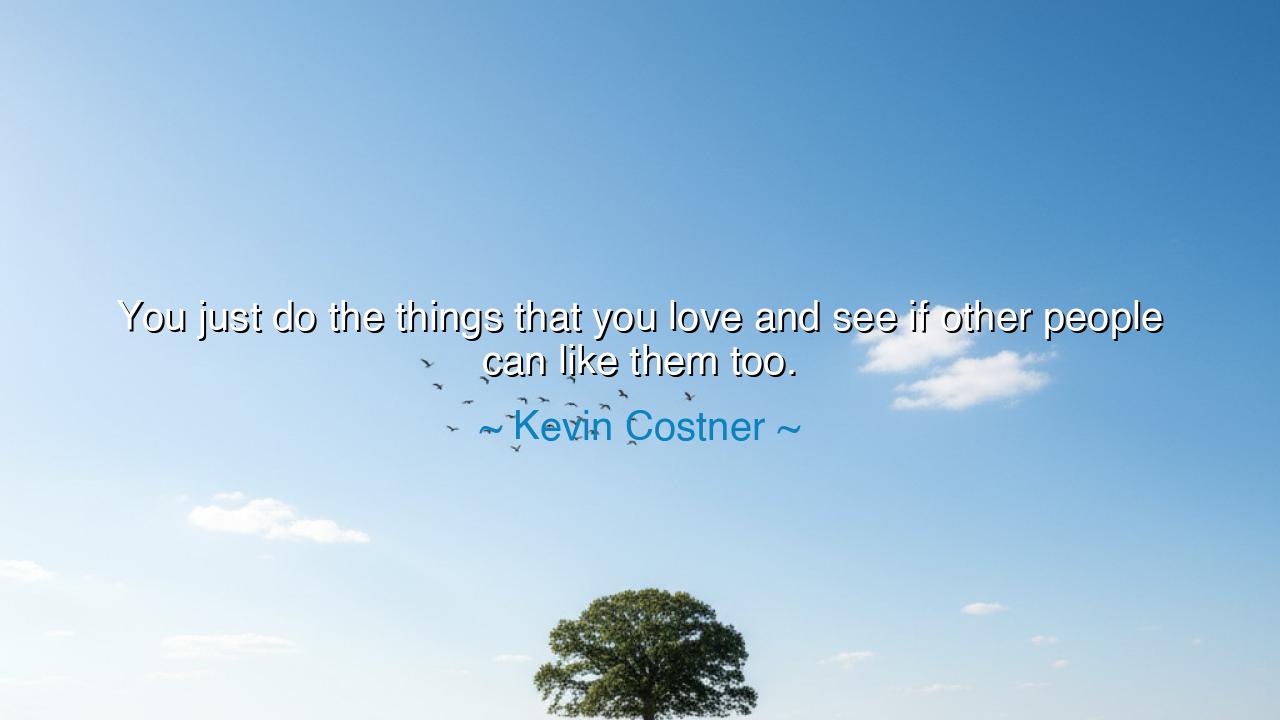
You just do the things that you love and see if other people can






In words both humble and timeless, Kevin Costner, the actor, director, and storyteller of the American spirit, once said: “You just do the things that you love and see if other people can like them too.” These words, though simple, carry the weight of profound truth — the truth that all creation, all art, all meaning in life begins first within the heart, not the crowd. In them lies the wisdom of the ages: that one’s purpose must spring from love, not from the hunger for approval. For those who chase applause will find emptiness, but those who follow their passion may awaken something eternal in others.
The origin of this thought comes from Costner’s own journey — a path marked not by certainty, but by courage. Before fame found him, he was a man with quiet dreams, uncertain of where they might lead. He acted not for recognition, but for the sheer joy of storytelling — for the love of shaping a world through character and vision. His greatest works, from Dances with Wolves to Field of Dreams, were not born from formula or fear of failure, but from the pure conviction that stories rooted in authentic love can touch the soul. His words remind us that the truest creation begins not with the desire to please others, but with the courage to be true to oneself.
To do what you love is to walk the path of the heart — a path that is often lonely, uncertain, and misunderstood. The ancients knew this well. The sculptor Michelangelo carved not for patrons or princes, but for the divine whisper that spoke to him through stone. When asked how he created his masterpieces, he replied, “I saw the angel in the marble and carved until I set him free.” So too does Costner’s wisdom echo this truth: that greatness is not forced or fabricated; it is discovered through devotion, through doing what stirs the soul, and allowing others to witness the light that flows naturally from it.
Yet this path demands courage, for love alone does not guarantee recognition. Many who have followed their passion have walked through years of obscurity, misunderstanding, even failure. Vincent van Gogh painted with heart and fire, though the world turned its eyes away. In his lifetime, he sold almost nothing, yet his love for color, for light, for beauty itself never wavered. Today, his work awakens awe across the world — not because he sought fame, but because he stayed faithful to what he loved. This is the deeper truth in Costner’s saying: that when we act from love, time itself becomes our ally, and the world eventually recognizes the authenticity of what was born from the soul.
To “see if other people can like them too” is not to beg for approval, but to share a gift. It is the act of opening one’s heart and saying, “This is what I have made — not for applause, but in hope that it may bring joy.” True artists, true dreamers, and true leaders know that love, when shared, multiplies. Every great innovation, from the writings of Shakespeare to the inventions of Da Vinci, began not as a desire to impress, but as a desire to express. The measure of one’s work, therefore, lies not in its reception, but in its sincerity.
There is a deeper harmony in this philosophy — a balance between individual joy and collective connection. For when we act out of love, we align with what is universal. The poet Khalil Gibran once wrote that “work is love made visible,” and Costner’s words sing the same melody. When we create from love, we invite others into that sacred space of feeling and meaning. We give them permission to connect, to feel alive, to remember their own passions. Thus, the artist’s love becomes the audience’s awakening, and what began as a private joy becomes a shared flame.
So, dear listener, take this teaching into your heart: do the things you love — not because they are easy, nor because they guarantee success, but because they make your spirit shine. Let the world see your light, unfiltered by fear or expectation. Create, serve, build, sing, or teach not for validation, but for the sheer beauty of the act. And then, as Costner says, see if others can like them too. If they do, you will have given them a gift born of truth; if they do not, you will still have lived authentically — and that is the greatest victory of all.
For in the end, as Kevin Costner teaches, life’s worth is not measured in applause, but in love expressed through action. The heart that follows its joy changes the world, even if it begins in silence. So live by this timeless wisdom: let love guide your hand, let sincerity shape your craft, and trust that what is created in truth will find its way to those who need it most. For when you live and create from the depths of love, you not only fulfill your own purpose — you awaken the soul of the world itself.






AAdministratorAdministrator
Welcome, honored guests. Please leave a comment, we will respond soon